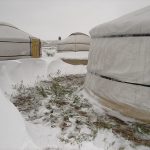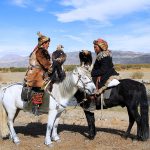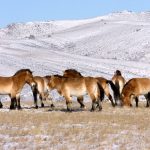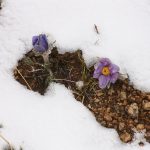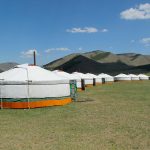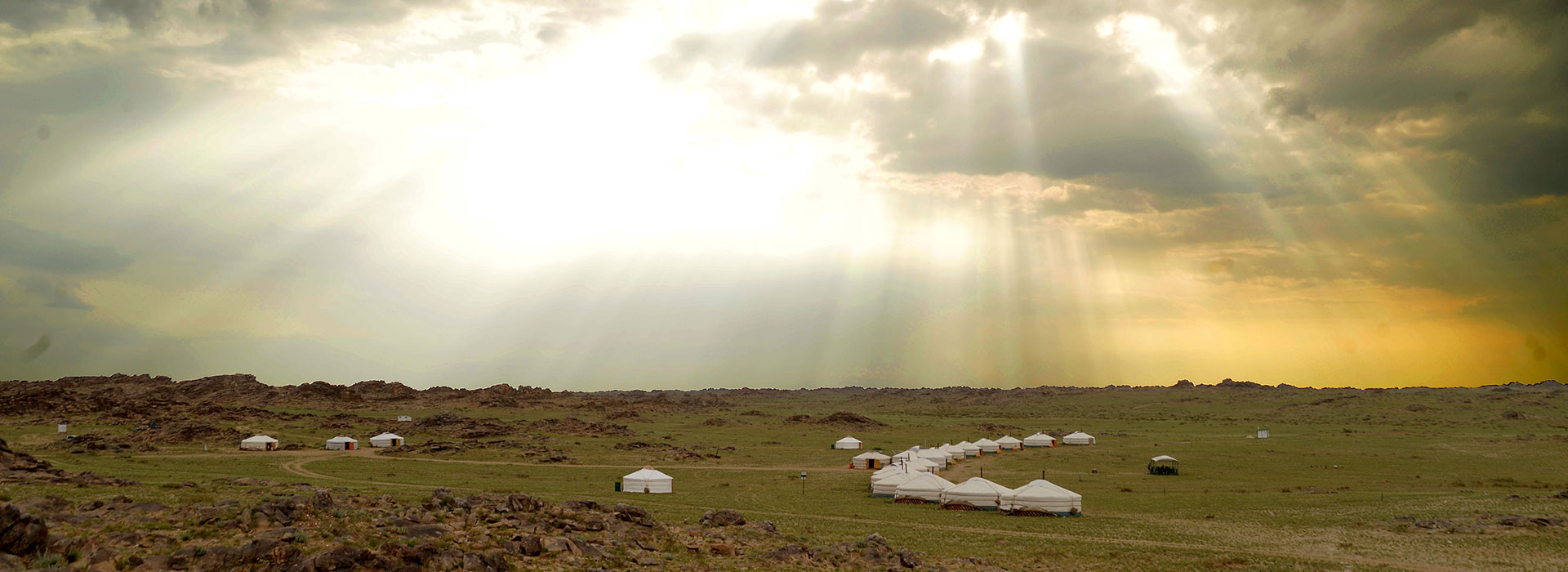
Ikhnart Rocks Wilderness Winter
Introduction
A journey to the Eastern Gobi is an intimate and very unique experience. The Ikh Nartiin Chuluu Plateau has rich and unique landscapes consisting of granite rock formations, but also semi-arid steppes, small vernal pools, and springs with small stands of elms and poplars.
Ikh Nart is a community managed nature reserve where local people have partnered with the Denver Zoo Foundation, the Mongolian Academy of Sciences and Nomadic Journeys for research, conservation and tourism. It is one of the best Gobi wildlife areas, home to an estimated 1000 Argali Sheep (Ovis ammon), the world’s largest wild sheep with impressive horns, and about 200 Siberian Ibex (Capra sibirica). While not guaranteed there is a very good chance of seeing both species. A sizeable population of Cinereous Vultures (Aegypius monacha), the largest of Asian vultures, its size en par with the Andean condor, and a host of other avifauna, make for great birding. The area also abounds in prehistoric burial sites, petroglyphs and ruins of Buddhist monasteries, representing all layers of Mongolian archaeology.
Doing a tour on foot or by camel ride is the best way to explore the natural and cultural heritage of Ikh Nart first-hand, at your own pace. Hiking is excellent and rewarding, with easy climbs on to the rocks, overlooking the amazing landscape. Mountain bikes, horses and camels are available for riding. The cool evening sunsets over the Gobi are pleasant and rewarding. Your travel choice for Ikh Nartiin Chuluu will assist the conservation efforts in the area, as it brings finances to the local economy and protection efforts.
Nomadic Journeys’ own Ikhnart Rocks Ger Camp is a seasonal, low impact ger camp located on its own, right next to the reserve area. You travel there southeasterly along the Trans-Mongolian railway line towards Beijing by local train from Ulaanbaatar, and drive the remaining 40 km to the camp. Transfer back to Ulaanbaatar is by fine tarmac road for most of the way.
| Trip Details |
|---|
| Ikhnart Rocks Wilderness Winter |
| 4 Days / 3 Nights |
Trip Details
Brief Outline Itinerary
Nomadic Journeys operates a small seasonal ger (yurt) camp at Ikh Nart Nature Reserve. You can travel there southeasterly on the Trans-Mongolian railway line towards Beijing by a slow train from Ulaanbaatar. Disembark at Shivee Gobi or Tsomog, a small stations following after Choir town. Then drive 40 km to the Ikhnart Rocks Wilderness Ger Camp.
Ikh Nart Nature Reserve was established in 1996 as a wildlife reserve as it has intact populations of Gobi Desert fauna. There are plenty of opportunities for wildlife, walks and drives. There may be camels for rent as local East Gobi Desert nomadic communities still roam the reserve. The return journey to Ulaanbaatar would be by a night train but you may order a private day time transfer to Ulaanbaatar.
Day 1: To Ikh Nart Nature Reserve
At 09h00 pick up from your hotel in Ulaanbaatar and transfer to the railway station. Depart by the slow train at 10h15 and spend 6h20 traveling southeast over the grassland steppe, which gradually becomes the more arid Gobi steppe. Disembark at Shivee Gobi, a train platform seemingly in the middle of nowhere, but actually near the small town of Shivee Gobi, which serves a nearby open pit coal mine. Shivee Gobi is the next small platform after Choir. Drive to Ikh Nart.
Day 2-3: Ikh Nart Nature Reserve
For two days we will explore the Ikh Nart area through the Ikh Nart rocks areas and try view different kinds of wildlife. There is Argali Sheep, which are most common to be seen, but also Siberian Ibex (Capra Sibirica) and bird life. Three parallel mammal research projects are ongoing by Mongolian and foreign scientist’s. It is on Argali Sheep and Siberian Ibex, as well as on small carnivores primarily geared towards as Corsac Fox (Vulpes Corsac), Red Fox (Vulpes Vulpes), Badger (Meles Meles) and Pallas’s Cat (Otocolobus Manul) but also collecting any possible data on Lynx (Lynx Lynx) and Wolves (Canis Lupus) as well as its prey species such as gerbils, jerboas. And
hedgehogs. For aviafauna there is ongoing research of Cinereous Vulture and Lesser Kestrels (Falco Naumanni). Botanist’s are also regular visitors. Research outcomes will be made available at camp through our guides, as well as directly by Mongolian student researchers, as it develops. Herders come and go at the Ikh Nart area. They are essentially reliant on pastures and any precipitation, why they are migrating a lot. Being Gobi herders, they migrate a lot. Very interesting,hospitable and hardy people.
Day 4: To Ulaanbaatar
A.m. Drive to the tarmac road and cross over it towards Choiriin Bogd Mountains, and drive towards where there are some remote Buddha statues in the rock faces. Picnic lunch. P.m. Drive to Ulaanbaatar 4 hours.
Itinerary Map
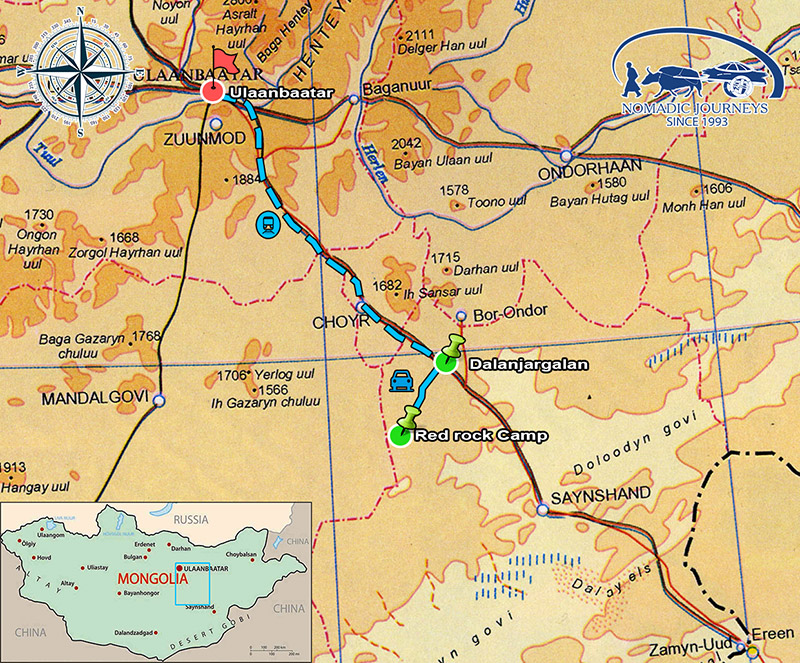
DATES 2020 ex Ulaanbaatar:
01st April – 15th May
30th September – 01st November
PRICE 2020 ex Ulaanbaatar:
2 – 8 members: USD 1450 per person
Single supplement (3n): USD 900
Practicalities:
Transport:
This tour is supported by a jeep or minibus depending on the number of travelers.
Accommodation:
For this winter trip you will stay a fully collapsible ger camp, including showers and compost toilets. The gers are each equipped with cot beds (including full linen), chairs and a table, and a wood burning stove.
Staff:
A Mongolian English speaking guide will accompany the group at all times. In addition, the services of local herdsmen will be employed along with their animals.
Meals:
Our cook will prepare the meals. We pride ourselves in having excellent cooks adept at both western and Mongolian cooking on our trips.
Additional:
We can organize hotel accommodation, city tours and transfers in Ulaanbaatar.
Includes:
Guide, all meals outside Ulaanbaatar. All overnights in ger camp. All local transport and entrance fees.
Excludes:
Beverages. Transfers and accommodation in Ulaanbaatar. Air or train tickets in and out Mongolia.
What our guests say
We appreciate your feedback about our tours and services.
You might also enjoy these trips

